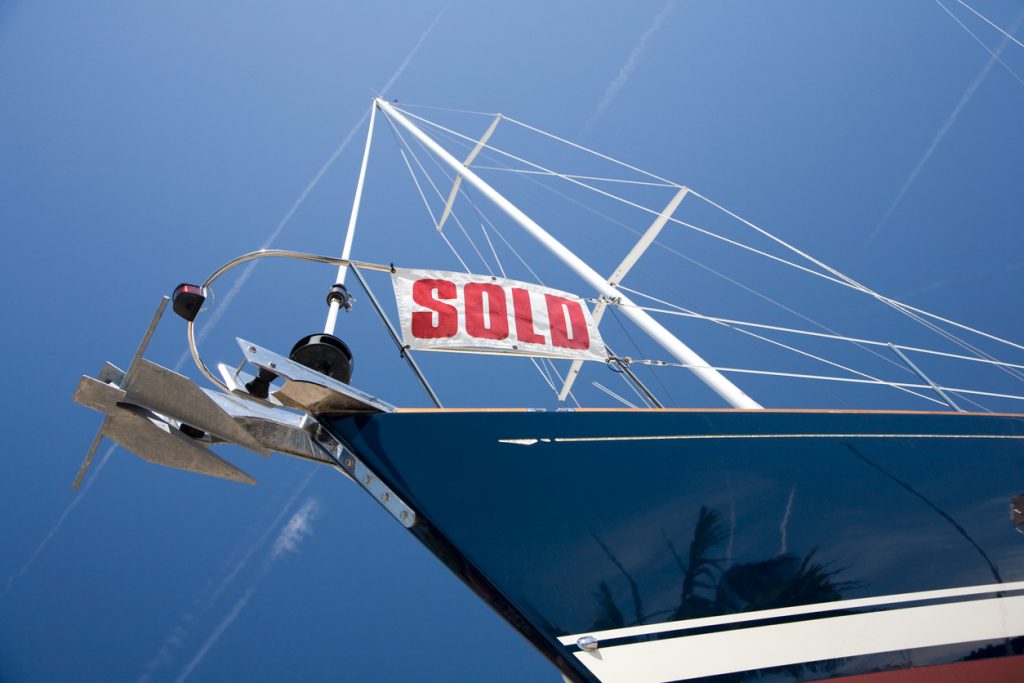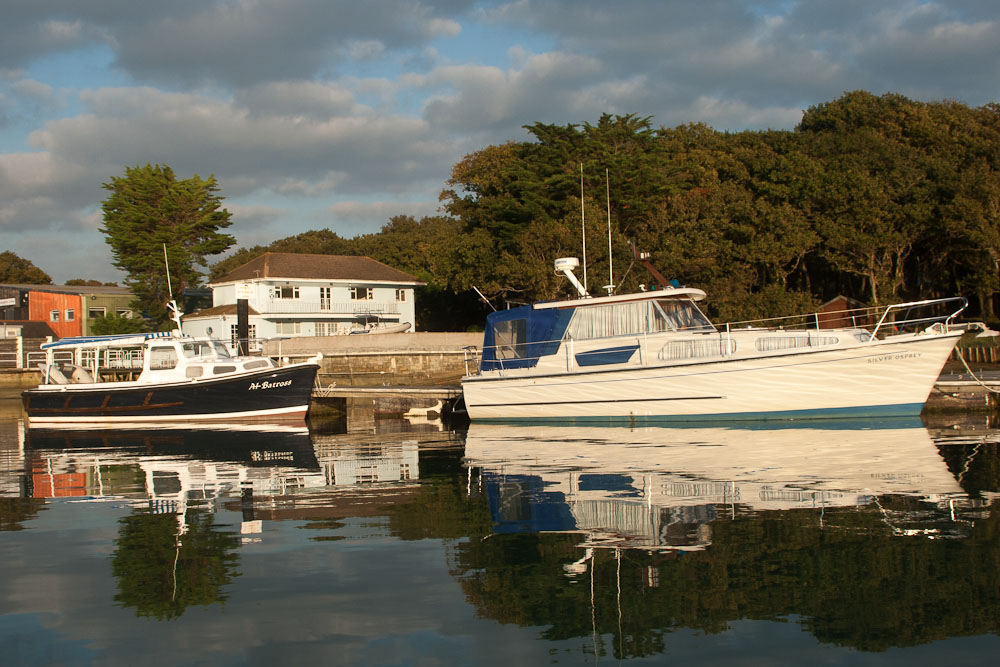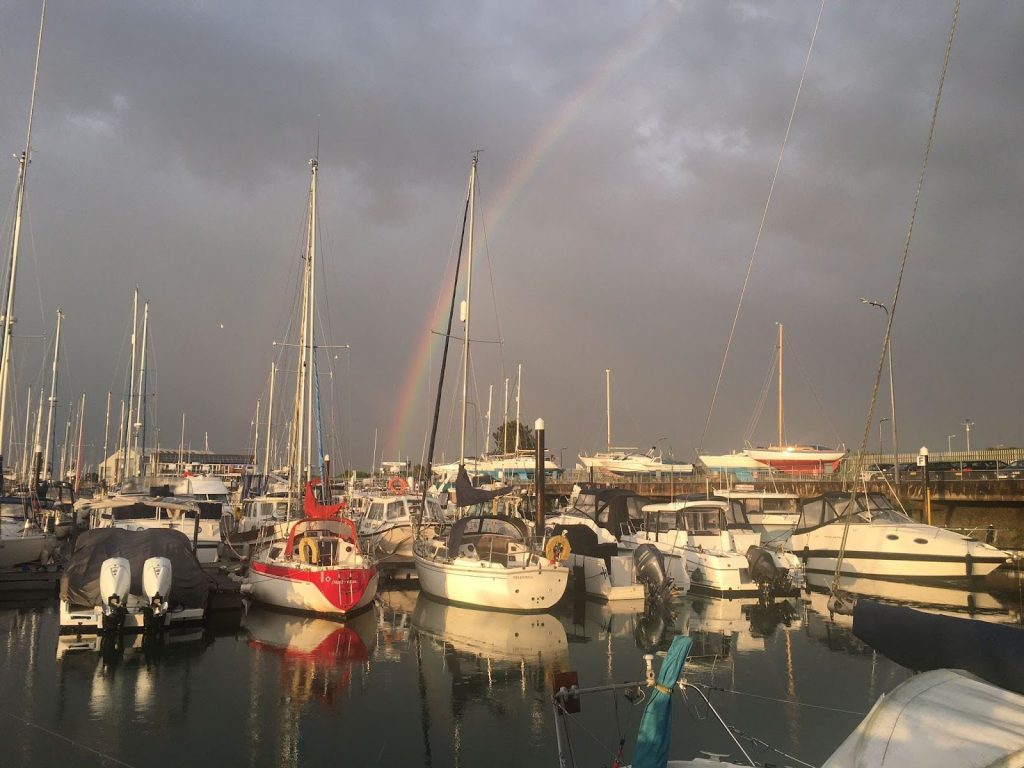The Needles Channel can be a fearsome place to sail. Tales of yachtsmen who have crossed the Atlantic and encountered their roughest seas here only miles from the safety of the Solent need to be listened to. Today huge waves sweep clean over our bow, flooding the deck’s knee-deep in water. The power of wind and sea is intimidating. Towering waves relentlessly sweep in from the west, filling the air with spray. To our starboard, a small yacht heading downwind towards Yarmouth gets broached by a breaking wave and swept side on, knocking her down, leaving her mast just above the sea. She recovers, but the next series of waves turns and knocks her down further so that her sails fill with water, holding her down longer, swamping her cockpit and maybe the cabin down below. I would hate to be aboard this struggling yacht in such huge seas.
We hold our course into wind, running with the strong tide past Bridge West Cardinal Buoy. The sea here is mountainous, but Cascadeur, our 12-ton Jeanneau is built for this environment. Yesterday the sea was like a millpond: neither wind nor current in this exact location. I could have jumped in and swam around the buoy and climbed back onboard as if in a swimming pool. We hold our course towards Poole for another 2 hours, smashing through an endless convoy of waves until just after 14:00 hours. Now the tide turns, flattening the sea as wind and tide flow together. We lower our reefed mainsail, open full Genoa and turn downwind, sailing a balanced boat safely back towards the Solent. Today I am instructing on an RYA sailing course for First Class Sailing, and my students are doing their Day Skipper / Competent Crew practical.
Background knowledge is essential in these situations, both in the passage planning and while at sea. It is RYA theory courses which allow sailing knowledge to be learned ashore then applied later. Having a picture in your mind about what could happen gives you an advantage when conditions at sea unexpectedly change.


May 2020 is strange. We are locked down at home. Marinas and clubs are closed, and we can’t go sailing, yet there are opportunities to learn new things and keep connected to the sailing world. We will be able to get afloat at some point in the future, so why not use this time wisely and either learn new skills or update the knowledge you already possess.

There are two types of online home learning courses available during lockdown. Both have their merits and provide valuable knowledge which you can use at sea later in the year.
Online, computer-based RYA courses are available through Sail Boat Project. This Community Interest Company is a non-profit organisation based on the south coast and helps people from disadvantaged backgrounds and abilities go sailing. To study, all you need is a laptop, iPad or PC and a passcode which gives you access to the online course. You will be posted workbooks, charts, dividers and plotter and away you go, working through a series of structured modules with small tests at the end to monitor your progress and learning. You are free to learn at your own pace and re-visit any section to embed learning. Feedback is provided immediately online, and an instructor is available for support.

SBP also offer a WhatsApp support group. Visit their website www.sailboatproject.org for booking details and contact numbers. On offer are RYA Essential Navigation, RYA Day Skipper and RYA Coastal Skipper/Yachtmaster theory courses. These courses are discounted currently.
I used this style of online learning for my Day Skipper theory course and found it gave me a comprehensive and detailed background knowledge to support my sailing skills. I would say this type of learning suits people who are confident in studying on their own.
There is another style of online training provided by First Class Sailing who are based in Southampton. They use Zoom’s software to deliver live, instructor-led online classes on your desktop or tablet. With this type of learning the instructor delivers the course at set times with students able to engage and ask questions directly. You log on to Zoom and follow the instructor’s lesson, interacting with other people on the course and the instructor from the comfort of home. This will appeal to learners who prefer interaction with the instructor in real-time. For some people in 2020, these courses provide a form of social interaction as much as learning something new. For more information and booking contact www.firstclasssailing.com
Students onboard my practical courses with recent theory knowledge, progress at a faster pace, and learn more complex skills because they have a bank of knowledge to draw upon while afloat. They are safer, more efficient and more able to look after their vessel and crew, reacting faster to their changing environment.
My training continues this year, having recently completed my Yachtmaster Ocean theory course and exam with First Class Sailing, held at the wonderful Cruising Association building at Limehouse Marina in London. I have met a few sailors, convinced of their abilities and very self-assured that there are no new tricks to learn. No matter how experienced you are, think about F1 racing drivers, tennis grand-slam winners and Olympic champions, they all receive coaching and training continually to keep them at the top of their game.


